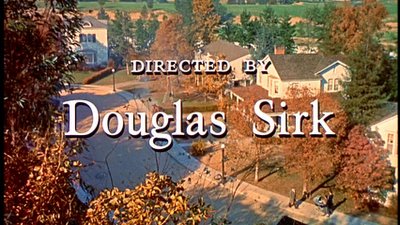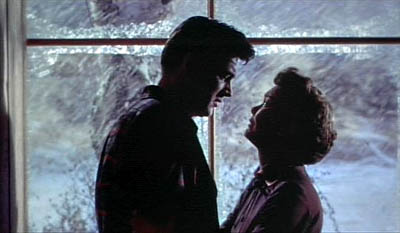
Watching Douglas Sirk manipulate everything he touches--the actors, the script, the sets, the lighting and color, and thus of course the audience--in All That Heaven Allows (1955) can evoke postmodern hipster scorn. Jane Wyman's stunned, unblinking mask and Rock Hudson's pretty-ful profile are precisely positioned in their Technicolor noir world, rich and deep and crossed with slanting shadows, like bonsai trees, a stylized "imitation of life" that fools no one, as fascinating as it might look. And such scorn is in part earned, because Sirk--along with his producer, Ross Hunter--stubbornly refuses to leave the movie alone. He fusses and prunes, tilting every chin just so, framing every scene like architecture, until we feel penned in by his manipulations.
The result, though, is an irresistible force that grabs me by the nape of the neck and makes me howl, "Uncle!" Or maybe "Mommy!" if only because Sirk rubs my nose in the small betrayals of families and lovers and of the past as it bullies the present and molds the future. Despite my arm's-length appreciation of his lighting, camera placement, and direction of his prop-actors, I must admit All That Heaven Allows is not to be refuted. Its revelations about 1950s conformity, the power of class and the emergent suburban demands to lay low and count your blessings--and the power of movies to grasp with nimble fingers my need to be entertained and to subdue my objections like my sweetie, twirling my hair in her fingers, murmuring my name like a breeze--seduce and confuse.
Or is it confuse to seduce? I can't say. All That Heaven Allows always dizzies me, as it did last night. I hadn't meant to watch it; I wanted to see Onibaba (1964) again, a Japanese film whose own dizzying seductions always make me want to sit and calm down. But I channel-surfed past Turner Classic Movies, and there it was, with all its weird vibes--Rock Hudson's purring monotone, those lime-green and burgundy cocktail dresses and draperies, Jane Wyman's Zelda-from-Dobie-Gillis daughter (Gloria Talbott)--inexplicably sexy; I don't even want to think about it--and I couldn't look away, a total package whose attraction for me says more about myself than anyone--most of all me--wants to know.

I'd like to shrug it off, but at the heart of All That Heaven Allows are some rocky truths that the movie's lush surface cannot obscure. Everyone who sees the film remembers two images:
(1) The presentation of the television set on Christmas morning, a gift from the children, who have finally gotten their way and completely suburbanized their mother. Her horrified, stupefied, caught-in-the-headlights face is eerily reflected in the looming, blank screen. She's inside the TV, like--well, like Jane Wyman, who made her way to Falcon Crest in the '80s--her face frozen in a terrified parody of courtesy.
(2) The morning of her reunion with Rock Hudson, who lies like Sleeping Beauty on the sofa as the huge shutters are opened and the blinding, snow-lined woods are revealed--with a tame deer right at the window, peering unconcerned; God's contribution to the decor.
Both scenes play to the same set of hopes--and the fears that accompany them--about home and family, about safety and reassurance. Sirk gives Cary and Ron to each other, but only after he ruins almost everything around them. Even Ron has to be wrecked, like Mr. Rochester in Jane Eyre, for Cary to burn down her own house, so to speak, and make her way back to him. And by the end she has only him: her children, the memory of her husband, her upper-middle-class life, all need to be obliterated by that winter sun, as serene and final as the idiot's gaze of the TV set. Sirk plays it any way he can: we are relieved Ron and Cary are together, but we know it's only because the movie wills them to be. In the real '50s--and onward to the millennium and beyond?--the TV won, and the shutters were closed on the brilliant landscape.

I just had a conversation with someone who said her New Year's resolution was to be joyful. Now there's a good idea, and I think it can be done--as long as one keeps the shutters open and turns off the TV. And this from Your Humble Viewer! I'd say I needed time off, if I didn't just have some. Oh well. Please close those shutters on your way out; there's a bright shadow on the screen.
(By the way, for a truly enlightening double bill, follow All That Heaven Allows with Far from Heaven (2002), Todd Haynes' reimagined, deconstructed homage to Sirk's movie. Curiouser and curiouser.)
No comments:
Post a Comment